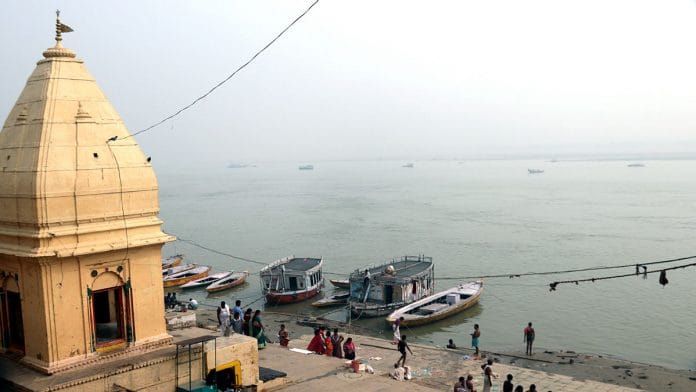New Delhi: The Narendra Modi government has proposed to set up an armed force called Ganga Protection Corps (GPC) to ensure the Ganga and its ghats and banks are conserved and well-managed, officials familiar with the matter have told ThePrint.
The government has also proposed heavy fines as well as the setting up of two new bodies to protect the river, considered holy by Hindus.
The GPC, which will come under the ambit of the Ministry of Home Affairs, is part of the new draft legislation — National River Ganga (Rejuvenation, Protection and Management) Bill, 2019 — that the Modi government is planning to introduce in the winter session of Parliament. The bill proposes to declare Ganga a national river.
The draft legislation, which has been in the making since 2017, has been sent to stakeholder ministries for consultation. “It will come up for approval in the cabinet shortly,” a senior official of the Union Water Resources Ministry who did not want to be named told ThePrint.
After coming to power in 2014, the Modi government had set up a special department — the National Mission for Cleaning Ganga — under the water resources ministry and launched the flagship river cleaning programme, ‘Namami Gange’, in 2015 with a budget outlay of Rs 20,000 crore. But despite these efforts, cleaning the Ganga continues to be an uphill task.
A December 2018 Central Pollution Control Board report found that the water quality was ‘clean’ or ‘slightly polluted’ at only four of the 41 testing locations before the monsoons, and only one of 39 locations after the rains. ‘Slightly polluted’ is defined as water of bathing standard, or which could support aquatic life.
Also read: A Modi promise not kept: Images reveal how a pure Ganga turns disgustingly brown
Jail terms and fines
The GPC will follow procedures as prescribed in the Code of Criminal Procedure (CrPC), and will have the power to arrest any person found littering or defacing ghats, engaging in any construction activity on the banks without permission, mining, extracting groundwater, or violating any other provision specified in the draft law. The force would then produce the violator before the local police station.
The bill proposes stiff penalties for dirtying the Ganga and obstructing its natural flow. The maximum penalty is Rs 1 crore or two years’ imprisonment for construction activities without permission, including construction of ports or jetties, storage or diversion of water by any means which obstructs the flow of water, or constructing sewage or effluent treatment plants.
Mining, stone quarrying or extracting groundwater will invite a fine of up to Rs 50,000 and imprisonment of up to one-and-a-half years. Spoiling or defacing ghats will result in a one-year jail term and a fine of up to Rs 25,000.
Also read: Idol immersion in Ganga fined: Which other rituals should Modi regulate for environment?
Two new bodies
The bill also proposes the setting up of a National Council for Rejuvenation, Protection & Management of River Ganga (shortened to National Ganga Council or NGC), under the chairmanship of the prime minister. It will be applicable in 11 states that fall in the basin of the Ganga or are home to major tributaries of the river.
The NGC’s mandate will be to formulate policy to ensure continuous adequate flow of water in the river and take emergency response measures to tackle sudden spike in pollution.
A National Ganga Rejuvenation Authority (NGRA), which will be the custodian of the river and its tributaries, will also be set up to coordinate with authorities concerned, inspect projects and industries coming up in the Ganga basin, and carry impact assessment of projects, structures or activities, including mining.
The NGRA will also grant approval to projects worth Rs 1,000 crore or less. Projects exceeding Rs 1,000 crore will be approved by an empowered governing body headed by the union jal shakti minister.
Zones for implementation
The draft bill also proposes to set up specified zones for the implementation of the provisions of the law. Each zone will have a director, appointed by the NGRA.
Cognisance of any offence under the law shall be taken on a complaint filed by the central government or the NGC, NGRA, empowered governing body, Ganga Protection Corps, zonal officers, or district Ganga committees.
Also read: Deadline to clean Ganga is next year but less than 30% of sewerage infra is ready






